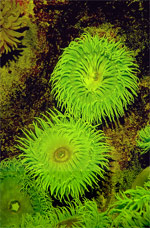Research by two Kansas State University scientists could help with the large-scale cultivation and manufacturing of oil-rich algae in oceans for biofuel.
K-State's Zhijian "Z.J." Pei, associate professor of industrial and manufacturing systems engineering, and Wenqiao "Wayne" Yuan, assistant professor of biological and agricultural engineering, have received a $98,560 Small Grant for Exploratory Research from the National Science Foundation to study solid carriers for manufacturing algae biofuels in the ocean.
Algae are a diverse and simple group of organisms that live in or near water. Certain algal species are high in oil content that could be converted into such fuels as biodiesel, according to Pei and Yuan. Algae also have several environmentally-friendly advantages over corn or other plants used for biofuels, including not needing soil or fresh water to grow.
Pei and Yuan plan to identify attributes of algae and properties of materials that enable growth of certain algae species on solid carriers. Solid carriers float on the water surface for algae to attach to and grow on.
"Not all materials are equally suitable to make these carriers," Yuan said. "Some materials are better for algal attachment and growth than others, and we will be identifying what those 'good' materials are."
The project could help with the design of major equipment for manufacturing algae biofuels from the ocean, including solid carriers, in-the-ocean algae harvesting equipment and oil extraction machines, Pei said.
"This research aims to develop a cost-effective process for growing algae on solid carriers in the ocean for biofuel manufacturing," he said. "If successful, it will greatly benefit the energy security of the United States, as well as society in general."
The research will be conducted with a two-step approach.
"Selected algae species will be grown on solid carriers in a simulated ocean environment and will be evaluated for their ability to attach to solid carriers and grow in seawater, their biomass productivity, and their oil content," Pei said. "Top-ranked species in step one will be selected to test the performance of several carrier materials, including natural organic, synthetic organic and inorganic materials, with the same evaluation parameters as in step one."
Pei said the properties of the highly-ranked carriers also will be analyzed.
Yuan, who has studied biodiesel for several years, said the major problem with making the fuel has been finding sustainable oil and fat sources.
"Algae seems to be the only promising sustainable oil source for biodiesel production," he said. "In my lab, we have several different projects involving algae and we have been trying different ways to grow it. We have already obtained some encouraging results."

